- Home
- Anne Mather
Pale Dawn Dark Sunset Page 10
Pale Dawn Dark Sunset Read online
Page 10
The following morning dawned with a golden heat haze clouding the sun. It was one of those delightful mornings that sometimes follows a storm, when everything appears especially brilliant, greener, brimming with vitality. Miranda, who had not slept very well, was up and dressed in a cream cotton shirt and cream pants by six-fifteen, and on impulse made her way downstairs to the kitchen in the hope of making an early breakfast.
Jezebel was already about, chivvying the other servants, supervising their chores and generally making her presence felt. She stared at the English girl in surprise when Miranda tentatively put her head around the kitchen door, and then demanded to know what she wanted at this hour.
Miranda opened the door wider and entered the large, well-lit kitchen, with its lines of polished units, its mechanised equipment, and long scrubbed table. Pale blue and lemon rubber tiles were soft underfoot, and a coffee percolator bubbled aromatically on a split-level stove. A door stood wide to the back of the house, and she could hear the sound of goatbells in the distance.
“I—well, I was wondering whether I might trouble you for some coffee,” Miranda admitted nervously. For all her age and dimunitive stature, Jezebel was an intimidating personality.
“Asi! You wish coffee here, señorita?”
Miranda shrugged. “Anywhere—if you don’t mind.”
Jezebel glanced at the startled Indian boy who was hovering near the oven with a tray of curled croissants for baking, and snapped him into action with a rapid command in his own language. Then she looked back at Miranda and to Miranda’s surprise her expression softened.
“You will sit?” she offered, indicating the long form which flanked the table, and Miranda nodded and seated herself. “Is today you go to lake with Don Rafael,” Jezebel went on, taking cups from shelves, setting a small try with cream jug and sugar basin. “Is it not, señorita…”
“Why, yes.” Miranda tipped her head on one side. “But how do you know that? We were supposed to go yesterday.”
Jezebel smiled then, revealing only a few stumps of teeth “Jezebel hear you talking to Don Rafael last evening, señorita,” she said, tapping significantly at her ear. Then she frowned. “The señorita likes Don Rafael, no?”
Miranda was taken aback and she rested her elbows on the table, cupping her chin in her hands to hide her reddening cheeks. “Don Rafael—has been very kind. He has offered to take me and—”
“—the niña. Yes, yes, I know, señorita.“ Jezebel poured coffee into an almost transparent china cup. “Alli, is good, si?”
Miranda accepted the coffee gratefully. “Very good. Thank you, Jezebel.”
The affairs of the kitchen distracted the old housekeeper for a few minutes and Miranda was relieved. Much as she appreciated the old woman’s good humour, she didn’t want to get involved in a discussion of the merits of the various members of the Cueras family.
Before Jezebel was free again, however, the door suddenly opened and Rafael himself walked in, his brows lifting interrogatively at the sight of Miranda.
“Buenos dias, señorita!” he greeted her gravely, and then a smile lifted the corners of his mouth as he saw Jezebel. “Como esta, vieja!”
They spoke together in their own language and Miranda would have given a lot to know exactly what they were saying. That she figured in their exchange was obvious from the gestures Jezebel was making, but she also noticed that Rafael avoided certain questions, shaking his head goodhumouredly. After a few minutes, he put Jezebel aside and went to help himself to coffee. After the first mouthful, he coughed, and making a brief apology he walked to the table and looked down at Miranda.
“Bien, señorita, what is it they say? Could you not sleep?”
Miranda moved her shoulders indifferently. “I was awake. I—I did think we might be leaving quite early.”
“How astute!” He quirked one eyebrow.
Miranda was glad of her cup between her fingers to disguise her nervousness. “How are you this morning señor?”
Rafael drank some more coffee, and frowned impatiently as he relapsed into a spate of coughing again. “I appear to have developed a slight congestion, señorita. But it is not serious. It will pass.”
“I’m not surprised,” exclaimed Miranda, shocked by her own temerity. “Wearing wet clothes!”
Rafael studied her indignant face for a disruptive moment, then he turned away. “Yes—well, you might be right, señorita,” he agreed dryly. “But one cannot always leave a man to drown simply because one wishes to change into dry clothes!”
“But you were still wearing them when you came up here last night,” she protested, to his broad, denim-clad back.
Rafael glanced round at her. “Someone had to tell the man’s wife that her husband was dead, señorita,” he stated expressionlessly. “She lives not too far from here.” He turned away again. “Ah—Jezebel, are those croissants ready? May I have one?”
Miranda stared mutinously down at the wooden table. She felt suitably chastened. But she hadn’t know that he had been breaking such news when he came up to the hacienda. Although she did recall his withdrawal, his refusal to enter the building.
Jezebel set a basket of hot croissants in the middle of the table, put out a dish of yellow butter, a jar of conserve. “Siéntese, señor,” she insisted, almost pushing him into the seat. “You and the señorita may share a meal, si?”
Rafael shrugged, his eyes flickering over Miranda only fleetingly. “A fondo, Jezebel. Gracias!”
Miranda couldn’t enjoy the intimacy of the situation because of what had gone before, and also because Jezebel hovered in the background like a predatory black crow. As soon as Rafael’s coffee cup was empty she swooped to refill it, watching him eating with evident satisfaction.
“Es bien, señor?” she asked eagerly, and he smiled and said: “Excelente, Jezebel, como usual. Muy gracias.”
When the meal was over, Rafael rose to his feet, finishing the dregs of his coffee as he did so. “You are ready, señorita?”
Miranda nodded and rose too. “Of course.”
“Bien. We will collect the niña on our way.”
Miranda glanced at her watch. It was only a little after seven. Surely too early for any member of the household to be about.
“I—I ought to leave a message,” she faltered.
“Jezebel will tell my mother where you have gone, señorita. Come! We will have the better part of the day, si?”
Driving away from the hacienda, Miranda felt an overpowering feeling of excitement. Jezebel had come to the terrace to wave them off and there was about her expression a certain suppressed satisfaction at this turn of events. Miranda couldn’t understand it—unless it had something to do with what Carla had said—something about Rafael not being interested in women. But that couldn’t be true. He wasn’t that kind of a man, she would stake her life on it. And besides, sometimes—only sometimes—when he looked at her, she had seen a certain reluctant awareness in his eyes…
She thrust such thoughts aside. She was not here to indulge in fantasies about herself and Rafael. She was to have at least half a day with Lucy and somehow she had to get through to her.
The fields in the valley were still running with water from the storm, but the people working barefoot in their midst still stopped to wave as they passed.
“Are the crops ruined?” exclaimed Miranda, concern dispelling the tension she had felt earlier.
Rafael glanced out of his window and made a slight movement of his shoulders. “Some will be, some will not. It is—as they say—the will of God. These people are happy to be alive.” His tone was indulgent as he turned to look at her. “Do you not agree that this is the important thing, señorita?”
Miranda stared steadily at him for a few moments, but then she had to look away. “I—suppose so.”
“You would not agree? Of course not. You are from that materialistic society where a man is judged on the property he possesses.”
“That’s not entirely
true—”
“No?” Rafael’s jaw hardened. “It is the same everywhere, señorita. I am not condemning your society any more than my own. And indeed, there are points on both sides. For all I accept that a man’s life—the quality of a man’s life—is the important thing, there are times when I find my beliefs stretched to a degree. Babies are born; they die; who can honestly say that such a futile existence merits a place in the scheme of things?”
“You mean—because of the—conditions…”
“Conditions are worse in other places, señorita. At least my country is not torn apart by civil war, at least a man can be sure—or reasonably sure, at least—of reaching his middle years.”
Miranda was fascinated. “Is that why you’re a doctor, señor? Instead of the patron?”
Rafael’s expression hardened. “We were not talking about me, señorita. Perhaps you should be occupying your time by considering the approach you intend to make to your niece. I warn you—my brother can be a formidable adversary.”
Miranda flushed. “I have already discovered what kind of an adversary your brother is, señor.”
Rafael frowned. “What do you mean?”
Miranda shook her head. “It’s not important.”
“Please—I want to know.”
Rafael was very persuasive. Miranda couldn’t help the tingle that ran along her veins at the thought of how persuasive he would be if he was saying: “Please—I want to make love to you.”
“Señorita!”
His harsh command brought her to her senses. “I—well—oh, he had me helping him, señor. Typing his letters, filing his correspondence!”
Rafael scowled. “When?”
“A couple of days ago.” Miranda was uncomfortable. “I owe it to him, after all. He is permitting me to stay at the hacienda—”
The word Rafael uttered under his breath would have been understandable in any language, and his mouth was clamped tightly together. “You will do no further secretarial work for my brother, señorita,” he stated bleakly. “I will see to that.”
Miranda didn’t know what to reply. “Thank you,” she murmured awkwardly.
When the Landrover turned into the overgrown courtyard of the monastery, Lucy herself came scampering out of the building to see who was there. When she saw Miranda and Rafael, however, her face visibly drooped and she fell back a pace.
“Hello, Lucy,” said Miranda, getting out of the Landrover and walking towards her smilingly. “Er—Don—Don Rafael and I have come to take you for a ride.”
Lucy’s lips curled. “I don’t want to go for a ride in that dirty old thing!” she exclaimed scornfully. “Tio Juan will be coming to take me out in his car.”
“No, he will not, Lucy,” returned Rafael, ignoring her rudeness. “Now, where is the padre?”
“Heme aqui,” called Father Esteban from the doorway of the building. “Please—you come in? I can offer you some milk, si?”
“Goat’s milk?” Rafael raised his eyebrows questioningly at Miranda and she made a helpless gesture. “A fondo, padre. We will come in for five minutes, no?”
Father Esteban led the way along a cold stone corridor to where he and Lucy had been sharing a simple meal. There was milk and cornbread and a dish of oranges and peaches. The room was stone-walled and chill after the heat of the day, but neither Father Esteban nor Lucy seemed to notice.
Rafael indicated that Miranda should be seated in the chair beside the plain table, while he lounged on a stool against the wall. Lucy, who had followed them inside reluctantly, hovered in the doorway, her lips moving rebelliously.
The goat’s milk was a lighter texture than ordinary milk, Miranda found, and although she was not a great lover of milk of any kind, it was not unpalatable. She refused anything to eat and listened while Rafael and the priest spoke together. They mostly used their native tongue, for Father Esteban was clearly happier in that, but later he announced that Lucy was teaching him English and that soon he expected to be properly proficient. Lucy responded to his gentle teasing, clearly feeling a great affection for him, too, but when the time came for them to leave she refused to let go of his hand.
“I want to stay with you, Father,” she cried urgently. “Don’t make me go away. Tio Juan is coming.”
Father Esteban shook his head. “Not today, niña, not today. Come, your aunt is here to see you only.”
Lucy sniffed pathetically. “She’s not my aunt. Tio Juan says I am a little Mexican girl now, and she is English!”
Rafael exchanged a glance with Miranda and she was warmed by the compassion she saw in his eyes. “Tio Juan should not say such things to you, Lucy,” he declared quietly. “You are English. Why else do you speak that language? And—and your aunt is very hurt when you speak so unkindly to her. You must remember, she has known you since you were a very little girl—a baby, in fact. And she also remembers your mother and father. Your mother was her sister. How do you think she feels, knowing that you are denying your own family? Do you think Tio Juan would deny his own family? Because I do not.”
“But Tio Juan told me that she wants to take me back to England with her, and England is a cold country where the sun never shines.”
Rafael made an impatient gesture. “Tio Juan has never been to England. He does not know what it is like.”
“Have you?” Lucy stared up at him appealingly.
“Of course.” Rafael ignored the way Miranda’s eyes widened.
“And does the sun shine there?” persisted Lucy.
“Naturalmente. Without the sun, we should all die, pequeña.”
“But what is it like?”
Rafael hesitated. “It is a small country, but a green country. A country of many contrasts. But its people are very friendly, very kind.”
Lucy’s lips trembled. “But what if I don’t like it?”
Rafael put a reassuring hand on her shoulder. “Lucia, nothing is decided yet, no? Let us face every consequence as it occurs. Come with us this morning, and perhaps, who knows, you may find your aunt is not the—how you say?—ogre?—you think her.”
Lucy looked uncertainly at Miranda. “All right. All right, I’ll come. But—but I want to sit in front. With you.” She looked at Rafael once more.
“We will all sit in front, pequeña,” essayed Rafael tolerantly. “Adios, padre. Hasta luego!”
As they all walked towards the Landrover, Miranda murmured in a low voice: “I didn’t realise you’d been to England, señor.”
Rafael looked penetratingly down at her. “I have not, señorita.”
“But—” Miranda’s lips parted in confusion.
“It was an acceptable deception, no?” Rafael’s eyes challenged hers. “I will make my confession de Neustra Señora, I promise.”
Miranda frowned. “What does that mean?”
Rafael shook his head and bent to lift Lucy into the front of the Landrover. “It is a matter between me and my conscience, señorita. Shall we go?”
CHAPTER SEVEN
RAFAEL drove away from the monastery following a winding track which hitherto Miranda had not noticed. It was little more than a goat track really and she doubted that any vehicle other than a Landrover could have made it. They drove up between stunted gorse and pine trees, steadily climbing away from the monastery until when she looked back the mission and the houses further down the valley looked doll-like and unreal. The underbrush gave way as they reached a narrow pass along a rocky precipice with a hair-raising drop on one side and the sheer wall of the mountain on the other. It was much cooler up here, too, and Miranda shivered when she thought of some cold grey stretch of water.
“Where are we going?” demanded Lucy at last, possibly becoming conscious of Miranda’s taut body beside hers.
Rafael took a moment to glance at the child. “We are going to a lake, Lucia,” he said calmly. “You know what a lake is, do you not?”
“Of course.” Lucy was indignant. “But where is it? How can there be a lake in the m
ountains?”
“There are often lakes in the mountains,” replied Miranda, forcing herself not to think of how easily it would be for the muddy track below them to cause the wheels of the Landrover to slide and pitch them all over the precipice. “Mountains create natural basins where water gathers. Particularly after rains like we had yesterday.”
Rafael shook his head. “The lake we seek is not that kind of a lake, señorita. But you will see—very soon.”
His enigmatic words had the effect of banishing Miranda’s nervousness, and she allowed the anticipation she had felt earlier to envelop her again. She was eager to reach their destination and even Lucy showed a growing curiosity.
The sheer walls of rock enclosed them for a space as they passed through its face, and then they emerged above a small canyon and Rafael stopped the Landrover so they could look down. At its base, Miranda could see the gleam of blue-green water, vaguely misty in the early morning light, while the lushly foliaged walls of the canyon were in marked contrast to the bare rock they had encountered so far.
“A natural phenomenon, is it not?” queried Rafael, with obvious appreciation of the two girls’ amazement. “Can you see the steam rising from the water? There is a hot spring which feeds the lake. The water is always warm.”
Miranda gasped. “It—it’s beautiful!” she exclaimed. “But—do we go down?”
Rafael nodded, starting the vehicle’s engine again. “For a short way. There is a plateau above the lake. We can climb down quite easily from there.”
“But how do we get up again?” wailed Lucy, as the Landrover began the steep ascent.
“Do not be a mouse, Lucia,” chided Rafael, the tautness of his tone belying the casualness of his words. “Is this not an adventure?”

 A Forbidden Temptation
A Forbidden Temptation Dark Castle
Dark Castle Hell Or High Water
Hell Or High Water Jake Howard's Wife
Jake Howard's Wife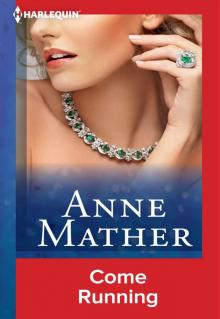 Come Running
Come Running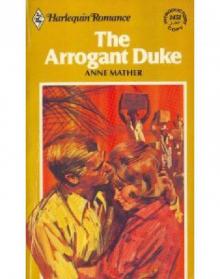 The Arrogant Duke
The Arrogant Duke Sweet Revenge
Sweet Revenge Passionate Protectors?
Passionate Protectors? Savage Awakening
Savage Awakening Come the Vintage
Come the Vintage An All-Consuming Passion
An All-Consuming Passion A Fever In The Blood
A Fever In The Blood The Shrouded Web
The Shrouded Web A Haunting Compulsion
A Haunting Compulsion Duelling Fire
Duelling Fire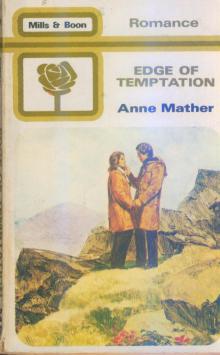 Edge of Temptation
Edge of Temptation Wild Enchantress
Wild Enchantress The Brazilian Millionaire's Love-Child
The Brazilian Millionaire's Love-Child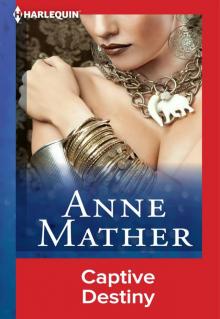 Captive Destiny
Captive Destiny The Pregnancy Affair
The Pregnancy Affair The Sanchez Tradition
The Sanchez Tradition A Passionate Affair
A Passionate Affair Sinful Truths
Sinful Truths Stay Through the Night
Stay Through the Night Seen by Candlelight
Seen by Candlelight No Gentle Possession
No Gentle Possession His Forbidden Passion
His Forbidden Passion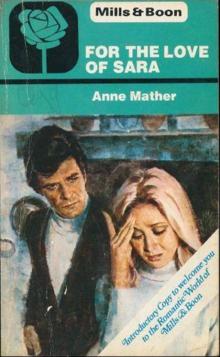 For the Love of Sara
For the Love of Sara A Trial Marriage
A Trial Marriage Melting Fire
Melting Fire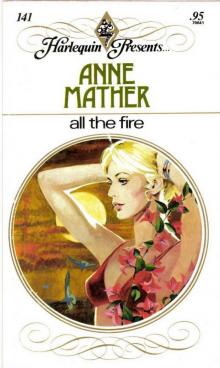 All The Fire
All The Fire Bedded For the Italian's Pleasure
Bedded For the Italian's Pleasure All Night Long
All Night Long The Japanese Screen
The Japanese Screen Rich as Sin
Rich as Sin Smokescreen
Smokescreen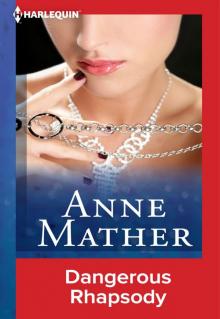 Dangerous Rhapsody
Dangerous Rhapsody Brittle Bondage
Brittle Bondage A Savage Beauty
A Savage Beauty Castles of Sand
Castles of Sand A Distant Sound of Thunder
A Distant Sound of Thunder THE VIRGIN'S SEDUCTION
THE VIRGIN'S SEDUCTION White Rose of Winter
White Rose of Winter Proud Harvest
Proud Harvest The Legend of Lexandros
The Legend of Lexandros Country of the Falcon
Country of the Falcon Diamond Fire
Diamond Fire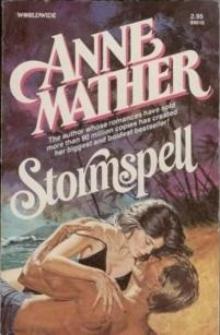 Stormspell
Stormspell Legacy of the Past
Legacy of the Past Such Sweet Poison/Blind Passion
Such Sweet Poison/Blind Passion The Baby Gambit
The Baby Gambit The Smouldering Flame
The Smouldering Flame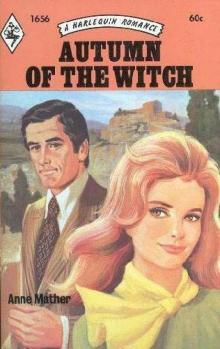 Autumn of the Witch
Autumn of the Witch Rachel Trevellyan
Rachel Trevellyan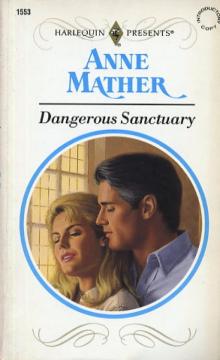 Dangerous Sanctuary
Dangerous Sanctuary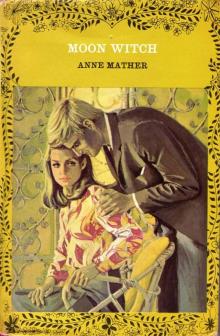 Moon Witch
Moon Witch An Heir Made in the Marriage Bed
An Heir Made in the Marriage Bed Images Of Love
Images Of Love Innocent Obsession
Innocent Obsession Tidewater Seduction
Tidewater Seduction Pacific Heat
Pacific Heat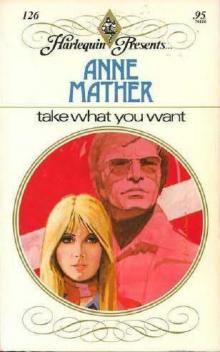 Take What You Want
Take What You Want The Spaniard's Seduction
The Spaniard's Seduction The High Valley
The High Valley A Woman of Passion
A Woman of Passion The Reluctant Governess
The Reluctant Governess Charade in Winter
Charade in Winter Mendez’s Mistress
Mendez’s Mistress Dark Moonless Night
Dark Moonless Night The Greek Tycoon's Pregnant Wife
The Greek Tycoon's Pregnant Wife The Autumn of the Witch
The Autumn of the Witch Night Heat
Night Heat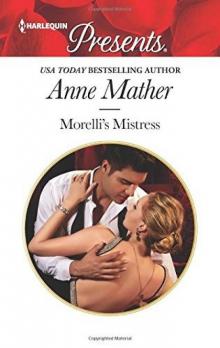 Morelli's Mistress (Harlequin Presents)
Morelli's Mistress (Harlequin Presents) Jack Riordan's Baby
Jack Riordan's Baby Beware the Beast
Beware the Beast Born Out of Love
Born Out of Love Greek Affairs in his Bed: Sleeping with a StrangerBlackmailed into the Greek Tycoon’s BedBedded by the Greek Billionaire
Greek Affairs in his Bed: Sleeping with a StrangerBlackmailed into the Greek Tycoon’s BedBedded by the Greek Billionaire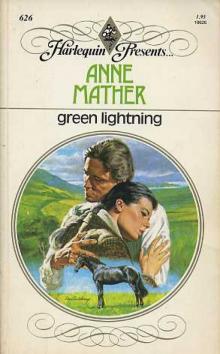 Green Lightning
Green Lightning Guilty
Guilty Snowfire
Snowfire Moondrift
Moondrift Stolen Summer
Stolen Summer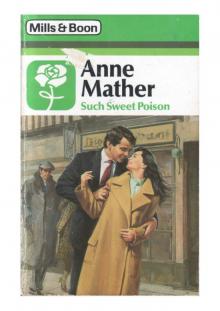 Such Sweet Poison
Such Sweet Poison Dark Venetian
Dark Venetian Innocent Sins
Innocent Sins Baby Out of the Blue
Baby Out of the Blue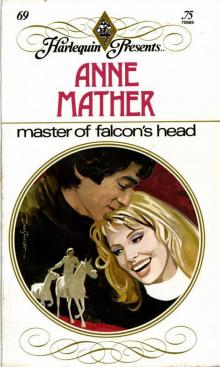 Master of Falcon's Head
Master of Falcon's Head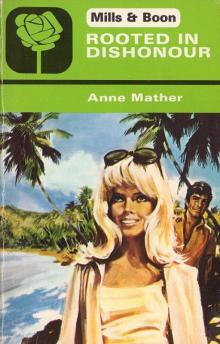 Rooted in Dishonour
Rooted in Dishonour A Secret Rebellion
A Secret Rebellion The Forbidden Mistress
The Forbidden Mistress Dangerous Enchantment
Dangerous Enchantment The Judas Trap
The Judas Trap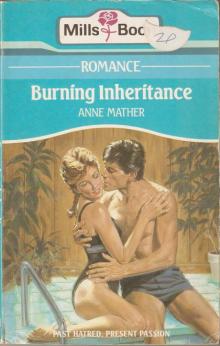 Burning Inheritance
Burning Inheritance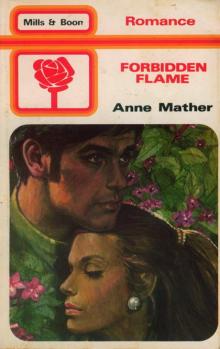 Forbidden Flame
Forbidden Flame Who Rides the Tiger
Who Rides the Tiger Impetuous Masquerade
Impetuous Masquerade Fallen Angel
Fallen Angel Act of Possession
Act of Possession Dangerous Temptation
Dangerous Temptation Pale Dawn Dark Sunset
Pale Dawn Dark Sunset Dark Enemy
Dark Enemy Innocent Virgin, Wild Surrender
Innocent Virgin, Wild Surrender Follow Thy Desire
Follow Thy Desire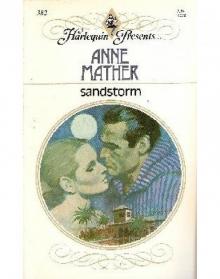 Sandstorm
Sandstorm Apollo's Seed
Apollo's Seed Whisper Of Darkness
Whisper Of Darkness A Wild Surrender
A Wild Surrender A Dangerous Taste of Passion
A Dangerous Taste of Passion The Night Of The Bulls
The Night Of The Bulls Hot Pursuit
Hot Pursuit The Longest Pleasure
The Longest Pleasure An Elusive Desire
An Elusive Desire Storm In A Rain Barrel
Storm In A Rain Barrel